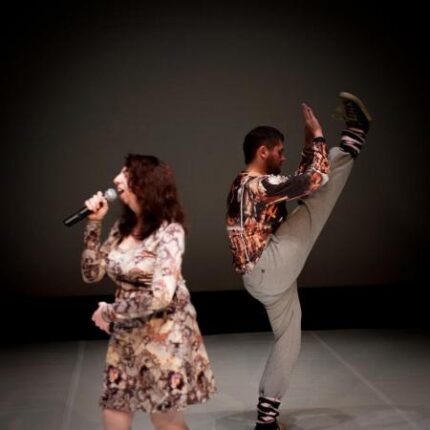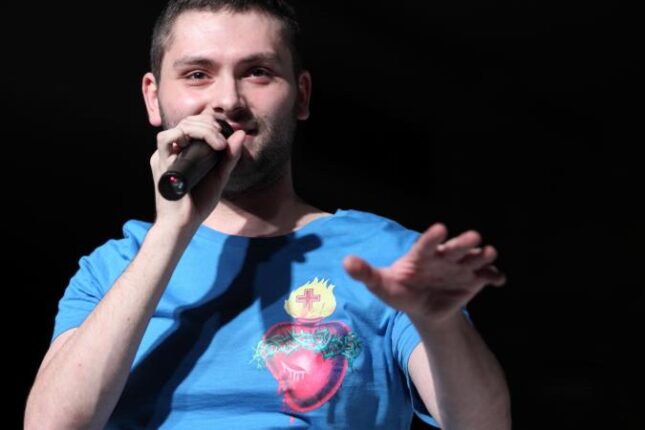Rafał Urbacki born in 1984 in Upper Silesia. He grew up in Gliwice. A director, critical choreographer, social debater, anthropologist of movement, retired performer, he studied drama directing at the Ludwik Solski Academy for the Dramatic Arts in Cracow, theatre studies at the Jagielloński University in Cracow, and cultural studies in Katowice. His debut as a wheelchair dancer came with the Kierunek Integrative Dance Theatre. Having spent 11 years in the wheelchair, he recently began to move on his own thanks to his own method of movement. He was a student of Iwona Olszowska. His artistic Project are chiefly devoted to the cultural perception of persons with alternative motor and/or sensory abilities, the archaeology of the working body, and the movement habitus of non-heteronormative persons. He is interested in the development of urban micro-communities, implementing projects with local populations at the intersection of choreography and grassroots work. Since his choreographic and performing debut, Urbacki has consistently implemented subsequent instalments of his identity project which focuses on the themes of difference, exclusion, stigmatization, contributing to ones community, participating in the community, and strategies of development of civic engagement through performance. Urbackis early works were autobiographical lecture-performances, in which he negotiated the performers space in the semantic space of their audience; his recent pieces gravitate towards multimedia installations preceded by months-long animation process and in-depth research of local communities.
Rafał Urbacki has created over 40 identity and participatory projects, choreodocumentaries, multimedia installations and socially engaged music projects, among others:
Erynie zostaną za drzwiami (National Stary Theatre, Cracow 2016) 24-hour trance and tantric multimedia installation on the perception of Jacek Malczewskis painting from the perspective of a child.
Jaram się (Industriada/ Silesian Theatre, Huta Królewska 2016) choreodocumentary on the phasing-out of metallurgy in Upper Silesia, referring to the choreographic works of Thatcherism and industrial rave parties. On the musical level, the piece uses excerpts from interviews with former and current workers of steel mills and foundries.
Ten 21 roczek (Silesian Museum / Museum of the Silesian Uprisings, Katowice 2016) multimedia installation / concert in the Silesian Museum complex, concluding the celebration of the 95th anniversary of the Silesian Uprisings, and critically addressing the local martyrology.
Bloki i familoki. Kabaret społeczny (Silesian Theatre, Katowice 2015) electro-cabaret/ concert on mental, urban, and cultural transformations in Katowice.
Kształt rzeczy. O węglu i porcelanie (The Shape of Things. On Coal and Porcelain) (Centre of Polish Stage Design, Katowice 2015) choreodocumentary about the workers of the former industrial plants Porcelana Śląska in Katowice-Bogucice, and the sorting plant of the Katowice coal mine; an installation verging on choreography (Kaya Kołodziejczyk), video (Anu Czerwiński), and social work on the archaeology of the working female body.
Nie z tej ziemi (Nothing of This Earth) Silesian Theatre / Industriada, Nikiszowiec 2015) interactive walk / application for smarphones set in the space of the former German blue-collar settlement; the piece addresses the gentrification of the district, its atrophy, and how the changes affected the local community.
Larmo w Bogucicach. Koncert dzielnicy (Larmo in Bogucice: A District in Concert) (Silesian Museum, Katowice 2015) performance featuring the Brass Orchestra Katowice, the social choir Ludzie z Bogucic, and the musician Bajzel, based on the animated series The Two Who Stole the Moon and tackling the migration in the restructured Bogucice district in the 1990s.
Western (in collaboration with Robert Talarczyk, Silesian Theatre, Katowice 2015) performance on 19th century Silesian emigrants in Texas.
Niech nigdy w tym dniu słońce nie świeci (Let the Sun Never Shine on This Day) (Fredro Theatre, Gniezno 2014) performance/ concert devoted to the residents of Gniezno, featuring performers with alternative motor and sensory abilities, as well as full-time actors, addressing the senselessness of social project, and referring to the medieval legend about the banishment of the crippled on the day of St. Adalberts church fair.
Gatunki chronione (Protected Species) (in collaboration with Anu Czerwiński, ROZBARK Theatre, Bytom 2014) choreodocumentary featuring performers with alternative motor abilities, set in the postindustrial space of the bird reserve Żabie Doły, touching upon the subjectivity of its protagonists in present-day Poland.
Serce robotnika napędza praca (The workers heart is driven by work) ROZBARK Theatre, Bytom 2014) a six-month cycle of actions for the community of the post-industrial distcit of Bytom, Rozbark, combined with a multimedia installation negotiating the new role of the old guildhall in the neighbourhood.
pod wielkim dachem nieba cz. 1 (4th Maat Festival, Lublin 2013) a cycle of actions / performance on homelessness and the artists role in the creation of the socially excluded groups.
W Przechlapanem (Theatre Institute, Warsaw 2012) performance / live act featuring women performers of alternative motor and/or sensory abilities, and their objectification by the media and culture.
stypa (funeral banquet) (Theatre of the Eighth Day, Poznań 2012) lecture-performance/ remix of Urbackis Mt 9,7 and Bill T. Joness Still / Here, summarizing Urbackis two-years long identity project using the figure of a paralytic-queer starlet. The piece addresses media censorship, based on Urbackis personal experience.
kto podskoczy jest pedałem, hej (in collaboration with Łukszen Laxy, Inicjatywa Pomada, Warszawa 2012) performance / concert on heterophobia in LGBTQI circles, and on the proposals of new narratives for liberation movements in Poland. The project was presented in Polish darkrooms, including the legendary FanTom in Warsaw.
Pocztówka z Polski (A Postcard from Poland) (in collaboration with with Łukasz Augustowski, 2012) social media initiative striving to activate citizens following the rejection of the bill on common-law marriages by the Polish parliament upon first reading of the bill.
rewind (Theatre Institute, Warsaw 2011) performance on the 1990s popular culture, based on the childhood memories of Polish performers.
Mt 9,7 [On wstał i poszedł do domu] (Matthew 9:7 [And he arose, and departed to his house]) (Old Brewery, Poznań 2010) autobiographical lecture-performance Urbackis coming out produced as part of the SOLO PROJEKT 2010 residence why priests in Poland claim having sex with a disabled person is not a sin but an act of charity. The media reactions spurred a highly constructive public debate on the subjectivity of people with alternative motor activity and non-heteronotmative persons.
Mover. Projekt społeczny (Mover: A Social Project) (Silesian Dance Theatre, Bytom 2010) performance/ live act starring dancers representing three generations of artists affiliated with the International Contemporary Dance Conference and Dance Art Festival in Bytom, and devoted to the working conditions of Polish dancers.
Zrównywanie (with Karolina Sokołowska, 14th International Contemporary Dance Conference and Dance Art Festival, Bytom 2010) site-specific installation / concert at the burnt school in Alojzjanów street in Bytom, addressing the pauperization of the neighbourhood and the changing function of public space in the local mythology.
Listen to an inteview with Rafał Urbacki on his choreomentaries, in which the artists combines choreography with documentary film:
http://sebastianpyplacz.pl/historia-zapisana-tancem-terazto-1/
***
He has choreographed over 50 film and theatre pieces, including Strzępka/Demirskis Tęczowa Trybuna 2012 (Rainbow Tribune 2012) (Polski Theatre, Wrocław 2011), Położnice Szpitala Św. Zofii (Women in Childbirth at St. Sophias Hospital) (Entertainment Theatre, Chorzów 2011), W imię Jakuba S. (In the Name of Jakub S.) (Dramatic Theatre, Warsaw 2011), Courtney Love (Polski Theatre, Wrocław 2012); Radosław Rychciks Dwunastu gniewnych ludzi (Twelve Angry Men) (Nowy Theatre, Poznań 2012), Karolina Kalwats Królowa ciast (The Queen of Cakes) (Jaracz Theatre, Olsztyn 2013), Zażynki (Harvest Theatre) (Polski Theatre, Poznań 2013), among others.
A two-time laureate of the scholarship of the Ministry of Culture and National Heritage, he is also the recipient of grants from the Art Stations Foundation by Grażyna Kulczyk and the Marshal of the Silesian Province. For the past several years, he has taught at the Academy of Music in Cracow and the Institute of Polish Culture at the University of Warsaw.
He is currently working on the archaeology of former factory workers bodies within the scope of Jaśmina Wójciks film / social work Symfonia Fabryki Ursus (Symphony of the Ursus Factory) (Polish Film Institute/ Museum of Modern Art / Wajda School). In 2013, together with his neighbours, Urbacki launched a new meeting platform for the co-habitants of his apartment block. Since then, he has continuously animated a range of activities within this small community, posting minute testimonies on his facebook profile.
Rafał Urbacki lives in Katowice.


